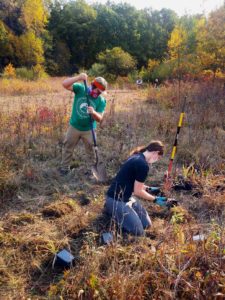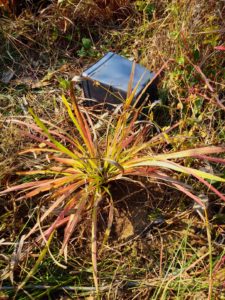On the Ground: Petersburg SGA Event a Win for Hunters and Naturalists Alike

OTG Volunteers Nick and Trisha work together to plant blazing star in an oak opening in the Petersburg SGA.
On Saturday, October 10, MUCC’s On the Ground (OTG) program partnered with The Nature Conservancy at the Petersburg State Game Area (SGA) to plant the native wildflower blazing star. A total of 450 blazing star plants were planted in two oak openings within the SGA by 18 volunteers.
Valuable to naturalists and hunters alike, the Petersburg State Game Area is home to diverse wildlife. From rare insects like the blazing star borer moth and Karner blue butterfly to the abundant white-tailed deer and wild turkey, this area has benefited greatly from habitat restoration efforts by many conservation organizations. The oak openings that make up significant portions of the SGA are also some of the last remaining oak openings in the midwest, and thus these ecosystems are of special concern to many natural resource management agencies and organizations. The health of our public lands has often been a unifying force for recreationists that may first appear to have conflicting views and this volunteer event highlights the shared commitment that hunters and naturalists have to ensure the health of the entire ecosystem so that all wildlife species may thrive.

An image of one of the blazing star plants planted in the oak openings within Petersburg SGA. All plastic plant containers were removed from the planting site following the event.
Following sign-in and introductions at the main parking lot within the SGA, volunteers divided into two groups to plant in two different oak openings within the state game area. Located off of Teal Road, these two openings were selected by The Nature Conservancy for the planting due to their topographical characteristics that would be best suited for the blazing star. Each opening had 225 blazing stars planted in selected locations throughout each field, and the project officially concluded at 1:30 p.m. As a thank you for their volunteerism and conservation ethic, all volunteers received an OTG Wildlife Volunteer t-shirt.
The OTG program has one event remaining this calendar year. Join us in Kalkaska on Saturday, October 24 as we plant native fruit trees to enhance habitat for wildlife like white-tailed deer, ruffed grouse and songbirds. To learn more about this event and the OTG program, please visit mucc.org/on-the-ground or email MUCC Habitat Volunteer Coordinator Makhayla LaButte at mlabutte@mucc.org.
The post On the Ground: Petersburg SGA Event a Win for Hunters and Naturalists Alike appeared first on Michigan United Conservation Clubs.
Recent Posts



